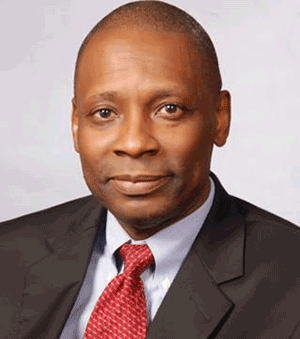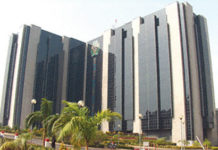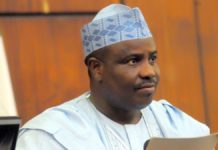Huge liabilities of the Central Bank of Nigeria (CBN), amounting to over N6 trillion as of November 2013, seem to foreclose the bailout of banks that run into troubled waters.
AMCON MD/CEO, Mustafa Chike-Obi
If it decides on a lifeline for a distressed bank, it has to do so at the grave risk of minting fresh notes “which will have consequences on price stability” and likelihood of naira devaluation.
These facts emerged at the launch of “Afrinvest 2014 Nigerian Banking Sector Report” in Lagos, where investment analysts x-rayed issues raised in the report, entitled “Navigating Growth in a Challenging Environment.”
The report said CBN’s liabilities rose from N2.1 trillion, or 190.5 per cent in December 2009, to N6.1 trillion in November 2013 following the acquisition of the debts of the Assets Management Corporation of Nigeria (AMCON).
AMCON was created by the CBN in 2009 to play the role of a “bad bank” which is to purchase the bad loans of the 24 registered banks. Four of the nine banks in grave danger of collapse in 2009 were nationalised by AMCON.
Investment without exit time frame
The banks were given about N620 billion lifeline to shore up capital, and N4 trillion was raised in bonds to clear bad loans.
Though AMCON has redeemed about N1.3 trillion of the bonds, over N5.21 trillion liabilities are outstanding, which the CBN will inherit after AMCON ceases to exist.
“These are long term investments without a discernible exit time frame other than the eventual performance of the loan portfolio,” the report said.
Afrinvest (West Africa) Managing Director and Chief Executive Officer, Ike Chioke, described the 2008/2009 bail out as proactive but expressed concern that policy adjustments reveal loopholes and weaknesses.
The complexity in design and abnormal levels of “allegedly” illicit transactions by some foreign banks has indicated a high level of corporate governance indiscipline.
“These illicit activities include the 2008 Societe Generale’s $68.5 billion rogue trading, UBS’s $2.2 billion fraud trading in 2013, JP Morgan’s $6.2 billion London Whale scandal in 2013, the Barclays’ LIBOR fixing scandal,” Chioke said.
They also include “more recently, Citigroup’s $7 billion settlement with U.S. authorities in July 2014 over mortgage scandal as well as the $9 billion BNP Paribas fine (July 2014) for illicit transactions from 2004 and 2012,” Chioke said.
Afrinvest noted that as a result of the scandals, regulators have introduced new policies to tighten the leash on banks. “All these have combined to elicit critical questions on what factors will shape the future of banking.”
Nigerian banks have raised $3.9 billion from the Eurobond market as Tier -2 capital since 2011.
They have raised up to $1.9 billion this year as pressure to boost capital adequacy ratio (CAR) mounts, preparatory to the full implementation of Basel 11 and 111.
FBN Holdings sold $450 million of securities due 2021 in July; Ecobank last month issued $200 million of notes maturing in 2021.
In June, Access Bank sold $400 million of seven-year subordinated notes; Stanbic IBTC Holdings plans to issue N30 billion bonds to raise funds to support growth. Union Bank has sealed a deal with Atlas Mara to raise $275 million.
Ecobank recently got a loan facility as partnership deal with a foreign lender after Doha-based Qatar National Bank (QNB) bought AMCON’s 1.77 billion ordinary shares of Ecobank valued at N35.6 billion per share and 732.3 million preferred shares valued at N17.01 per share.
Chioke advised banks to design ways to adapt to a changing landscape in 2014, leveraging on large retail banking opportunities.
Nigeria has highest treasury bill, inflation rates
Afrinvest also noted that Nigeria’s Treasury Bills and inflation rates at 7.9 per cent are the highest among emerging markets. South Africa has an inflation rate of 5.2 per cent, India (6 per cent), Brazil (5.9 per cent), China (3.10 per cent), and Turkey (7.10 per cent).
Afrinvest, an indigenous investment banking and research group, stated in its report that rising inflation rate makes it difficult for the CBN to gradually reduce interest rate, which may lead to devaluation of the naira or exhaustion of foreign reserves.
Chioke cited apprehension among industry watchers concerning the financing of power projects in Nigeria through Eurobond proceeds.
The fear is hinged on currency mismatch as cash flows from power assets are generated in naira.
“More worrisome, however, is that many of the GENCOS (generating companies) and DISCOS (distribution companies) earn significantly less than their projected cash flows prior to acquisition due to government’s inability to resolve tariff and gas supply challenges.
“Cumulatively, the apex bank should keep a close watch on banks risk assets to the power space in order to avoid the emergence of another era of toxic assets,” he warned.
He cautioned that power privatisation, done in 2013, may reveal structural and financial challenges in the near term, if not well managed.
Chioke stressed the need to shore up external reserves to avoid shocks in the system originating from capital reversals with huge adverse effects on the economy.
Need for CBN to stabilise naira
He cited the need for the CBN to implement better administrative measures to support the stability of the currency.
“The external reserves have recently retreated from their waning state, rising from a low of $36.7 billion in June 2014 to $39.7 billion as of September 4, 2014.
“This mild increase was associated with global supply disruptions pushing oil prices higher. However, foreign portfolio investors constitute an estimated 38.0 per cent ($15 billion) of the reserves.
“This implies that shocks in the system originating from capital reversals can have huge adverse effects on the economy. In addition, high oil prices and rising oil production have not entirely translated into strong currency reserves, as the CBN consistently expends the reserves (that is, primary liquid assets) in managing currency volatility.”
According to him, the balance of $24.4 billion in the external reserves is ideally the sum attributable to oil receipts.
Based on the $13.2 billion import estimates in Q1:2014, he added, the reserves can barely cover about five to six months of imports, which is lower than the official seven to eight months’ cover.













